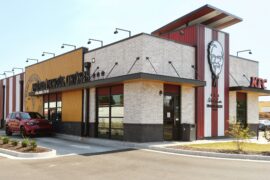Tyson Foods has officially announced that Dean Banks (pictured above) will succeed Noel White as chief executive officer on October 3, while maintaining his position as president. White, a 37-year veteran with the company who has led it through a period of unprecedented volatility and uncertainty since assuming the helm in 2018, will remain with Tyson in a new role as executive vice chairman of the board of directors.
Banks’ expanded role of chief executive officer is part of the board’s long-term succession planning. Since joining the Springdale, Arkansas, USA-headquartered meatpacker as a director in 2017 and being appointment as president last year, he has worked closely with the company’s leadership to develop a greater understanding of the business and strategic vision for future growth.
Banks, a former sergeant in the US Marine Corps, holds a BA from Miami University and an MBA from the Harvard Business School. He was previously a Project Lead and on the Leadership Team at X (formerly Google [x]), an Alphabet Inc. company, where he remains an advisor. Other leadership experience was gained at SEED Ventures, IntraCelluar Technologies (now Vergent Bioscience), Cleveland Clinic Innovations and the Ohio Orthopedic Commercialization Center, OrthoHelix (acquired by Tornier, Inc.); Connective Orthopaedics.
Coronavirus Pandemic Impacts Q3 Results
Meanwhile, on August 3 Tyson reported a 7.9% decline in third quarter sales of $10.022 billion. Earning per share fell 22% to $1.44 during the three-month period that ended on June 27, with the adjusted EPC of $1.40 down 5% from the prior year.
Gross profit for the quarter amounted to $1.313 billion, a 1.7% decline from the prior-year quarter. Adjusted operating income fell 4.5% to $760 million. On a positive note for the first nine months of the year sales of $31.725 billion are up by $204 million over the same period in 2019.
“Without a doubt, our third fiscal quarter was one of the most volatile and uncertain periods I’ve seen during my time in the industry,” said White. “However, our commitment to team member health and safety and investments in operations and portfolio strategy effectively positioned us to weather unprecedented Covid-19 marketplace volatility while allowing us to support our farmers, ranchers and producers and meet our customers’ needs.
“Within each of our segments, we absorbed higher-than-normal operating costs related to Covid-19. Nonetheless, Tyson delivered strong results during the third quarter led by strength in our beef and pork segments. Despite short-term challenges, we’re maintaining a clear focus on the long term. Our fourth quarter is off to a solid start, and while Covid-19 has been disruptive, we have a strong long-term outlook for Tyson Foods.”

Direct incremental expenses associated with Covid-19 totaled $340 million during Q3. The figure includes costs related to personal protection equipment for workers, sanitization of production plants, testing for coronavirus infection, bonuses of $114 million to frontline employees, and premiums paid to cattle producers.
Summary of Q3 Segment Results
Tyson’s chicken unit recorded an adjusted operating loss of $120 million from income of $237 million during the third quarter of 2019. Sales revenues fell 6.6% to $3.112 billion, while volume declined 4.2%. The decreases were primarily due to lower production throughput associated with the impact of Covid-19 in Q3 2020 and lower foodservice demand, partially offset by increased volumes in consumer products purchased at retail stores.
The decline in average sales prices was mainly attributed to weaker chicken pricing as a result of market conditions. Operating income was further impacted by $110 million of net derivatives losses in both the third quarter and the first nine months of fiscal 2020, and by approximately $50 million in increased feed ingredient costs in first nine months of fiscal 2020, as compared to the same periods in fiscal 2019. Additionally, operating income was impacted by $21 million in restructuring costs incurred in the first nine months of fiscal 2020.

Beef Sales Down 12.1%
Sales of beef products fell 12.1% to $3.653 billion. Volume slid 23.8% year over year because of reduced production related to the coronavirus crisis. Additionally, there was a reduction in live cattle harvest capacity as a result of a fire that caused the temporary closure of a production facility during most of the first quarter. Average sales prices increased in the third quarter and first nine months of fiscal 2020 as beef demand remained strong amid supply disruptions related to the impact of Covid-19.
Pork Sales Fall 15.7%
Sales in the pork segment declined 15.7% year over year to $1.115 billion. Volume was down 16.5% due to pandemic-led production disruption, though demand was solid and there was higher availability of pigs to slaughter. Average sales prices rose for the same reason affecting he beef market.

Prepared Foods Revenues Slip 2.6%
Sales in the prepared foods segment decreased by 2.6% to $2.035 billion in the third quarter, as growth across the consumer products channel was offset by a reduction in the foodservice sector related to weakened demand and lower production due to the impact of Covid-19. Volume dropped 6% and operating income decreased primarily due to increased operating costs, including a $135 million rise in net raw material costs and derivative losses in the first nine months of fiscal 2020, as well as production inefficiencies and direct incremental expenses related to the coronavirus pandemic. Additionally, operating income was impacted by $22 million restructuring costs incurred in the first nine months of fiscal 2020.
Shares of Tyson Foods, which trade as TSE on the New York Stock Exchange, closed at $62.43 on August 3, up +0.98% for the day. During the past 52 weeks the high and low prices have been $94.24 and $45.57, respectively.






